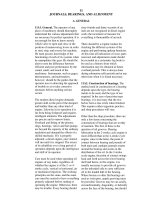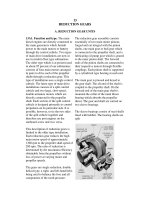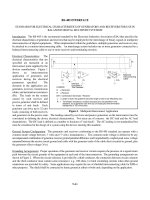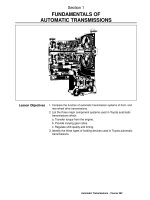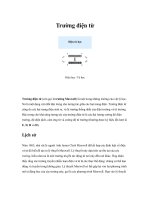Tài liệu WHAT ENGINEERS DO pptx
Bạn đang xem bản rút gọn của tài liệu. Xem và tải ngay bản đầy đủ của tài liệu tại đây (722.45 KB, 27 trang )
Ho Chi Minh City University of Technical Education
Ho Chi Minh City University of Technical Education
WHAT
ENGINEERS DO
Higher Engineering Education Alliance Program
Instructor:
Instructor:
What is an engineer?
An engineer is a creative,
ingenious person.
What does an engineer do?
Engineers create ingenious
solutions to societal
problems.
WHAT DO ENGINEERS DO?
Engineers are creative people that use
mathematics, scientific principles,
material properties, and computer
methods to design new products and
to solve human problems. Engineers
do just about anything, including
designing and building roads, bridges,
cars, planes, space stations, cell
phones, computers, medical equipment,
and so forth.
4
Engineering is….
A Profession
Design
Development
Test
Assembly/Production
Engineering is also
•
Team Work
•
Communication
•
Ethics
The Engineering Design Process
. (text)
1. Identify the need
2. Define the Problem
3. Search
Sketch 4. Constraints
5 Criteria
6 Design
6. Alternative solutions
Model 7. Analysis /Test
8. Decisions
9. Specifications
Build 10. Communication
.
6
Design
Develop
Test/Evaluat
e
Manufacture
Assemble
Communicate
Analyze
management
The Engineering Process
Example 1.1
Figure 1.1 shows a generic car with numbered parts. Without
cheating from the footnote, fill in the correct number
corresponding to the object in each of the blanks.4
A first step in an engi- neer’s approach to a
problem is to draw a conceptual sketch of the
problem. Artistic talent is not an issue, nor is
graphic accuracy. The engineer’s conceptual
sketch will not look exactly like the thing it
portrays. Rather, it is intended to (1) help the
engineer identify the elements in a problem,
(2) see how groups of elements are
connected together to form subsystems, and
(3) understand how all those subsystems
work together to create a working system.
Example 1.2
On a piece of paper draw a conceptual sketch
of what happens when you push on the pedal
of a bicycle. Before you begin, think about
these questions:
1. What are the key components that connect
the pedal to the wheel?
2. Which ones are connected to each other?
3. How does doing something to one of the
components affect the others?
4. What do those connections and changes
have to do with accomplishing the task of
accelerating the bicycle?
Solution
Here is what your sketch should contain
(see Figure 1.2). The pedal is
connected to a crank, and the crank is
connected to a sprocket. A chain
connects the sprocket to a smaller
sprocket on the rear wheel. This
sprocket is connected to some type of
transmission with gears that turns the
rear wheel
What are personal ethics and what do they
have to do with engineering?
Personal ethics are the standards of human
behavior that individuals of different cultures
have con- structed to make moral judgments
about personal or group situations. Ethical
principles have developed as people have
reflected on the intentions and consequences of
their acts. Naturally, they vary over time and
from culture to culture, resulting in conflict
when what is acceptable in one culture is not in
another.
The Five Cornerstones of Ethical Behavior
Here are some examples of codes of
personal ethics. At this point you might want
to compare your own personal code of ethics
with the ones listed here.
-
Do what you say you will do.
-
Never divulge information given to you in
confidence.
-
Accept responsibility for your mistakes.
-
Never become involved in a lie.
-
Never accept gifts that compromise your
ability to perform in the best interests of
your organization.
Top Ten Questions You Should Ask Yourself When
Making an Ethical Decision
1. Could the decision become habit forming? If so,
don’t do it.
2. Is it legal? If it isn’t, don’t do it.
3. Is it safe? If it isn’t, don’t do it.
4. Is it the right thing to do? If it isn’t, don’t do it.
5. Will this stand the test of public scrutiny? If it
won’t, don’t do it.
6. If something terrible happened, could I defend
my actions? If you can’t, don’t do it.
7. Is it just, balanced, and fair? If it isn’t, don’t do it.
8. How will it make me feel about myself? If it’s
lousy, don’t do it.
9. Does this choice lead to the
greatest good for the greatest
number? If it doesn’t, don’t do it.
And the #1 question you should ask
yourself when making an ethical
decision:
10. Would I do this in front of my
mother? If you wouldn’t, don’t do it.
WHAT ARE PROFESSIONAL
ETHICS?
- A professional code of ethics has the goal
of ensuring that a profession serves the
legitimate goals of all its constituencies:
self, employer, profession, and public.
- Having a code of ethics enables an
engineer to resist the pressure to produce
substandard work by saying. It also enables
the engineer to similarly resist pressures to
allow concerns such as personal desires,
greed, ideology, religion, or politics to
override professional ethics.
National Society of Professional Engineers
(NSPE) Code of Ethics for Engineers
Engineering is an important and learned
profession. As members of this profession,
engineers are expected to exhibit the highest
standards of honesty and integrity. Engineering
has a direct and vital impact on the quality of life
for all people. Accordingly, the services provided
by engineers require honesty, impartiality,
fairness, and equity, and must be dedicated to the
protection of the public health, safety, and
welfare. Engineers must perform under a standard
of professional behavior that requires adherence
to the highest principles of ethical conduct.
Fundamental Canons
Engineers, in the fulfillment of their
professional duties, shall:
-
Hold paramount the safety, health, and
welfare of the public.
-
Perform services only in areas of their
competence.
-
Issue public statements only in an
objective and truthful manner.
-
Act for each employer or client as
faithful agents or trustees.
-
Avoid deceptive acts.
-
Conduct themselves
honorably, responsibly,
ethically, and lawfully so as
to enhance the honor,
reputation, and usefulness of
the profession.
Example 1.3: An Ethical Situation
The following scenario is a common situation
faced by engineering students. Read it and
discuss how you would respond. What are your
ethical responsibilities?
You and your roommate are both enrolled in the
same engineering class. Your roommate spent
the weekend partying and did not do the
homework that is due on Monday. You did the
homework, and your roommate asks to see it.
You are afraid he or she will just copy it and turn
it in as his or her own work. What are you
ethically obligated to do?
a. Show your roommate the homework.
b. Show the homework but ask your
roommate not to copy it.
c. Show the homework and tell the
roommate that if the homework is
copied, you will tell the professor.
d. Refuse to show the homework.
e. Refuse to show the homework but
offer to spend time tutoring the
roommate.
Let us see which of the Five
Cornerstones apply here.
1. Do what you say you will do. If the
teacher has made it clear that this is an
individual assignment, then by
participating in the assignment you have
implicitly agreed to keep your individual
effort private. Allowing your homework to
be copied means going back on this
implicit promise. This implies that answer
(d) or (e), “Refuse to show the homework,”
is at least part of the right answer.
2. Never divulge information given to you in
confidence. Again, homework is implicitly a
confidential communication between individual
student and teacher. By solving the problem,
you have created a confidential communication
with the teacher. This is more support for
choice (d) or (e).
3. Accept responsibility for your mistakes.
Sharing your homework will enable your
roommate to evade this standard. Being an
accomplice in the violation of standards by
others is itself an ethical violation. This is
further support for choice (d) or (e).
4. Never become involved in a lie. Allowing
your homework to be copied is participating
in a lie: that the work the roommate turns
in is his or her own work. This further
supports choice (d) or (e).
5. Never accept gifts that compromise your
ability to perform in the best interests of
your organization. Since the roommate has
not offered anything in exchange for the
help, this standard appears not to apply in
this case.
Four of the five cornerstones endorse
choice (d) or (e), refuse to show the
homework, and the fifth cornerstone is
silent. These results indicate that your
ethical obligation under this particular code
of personal ethics is to refuse to show the
homework.
Many people will find the Five Cornerstones
to be incomplete because they lack a canon
common to most of the world’s ethical
codes.





